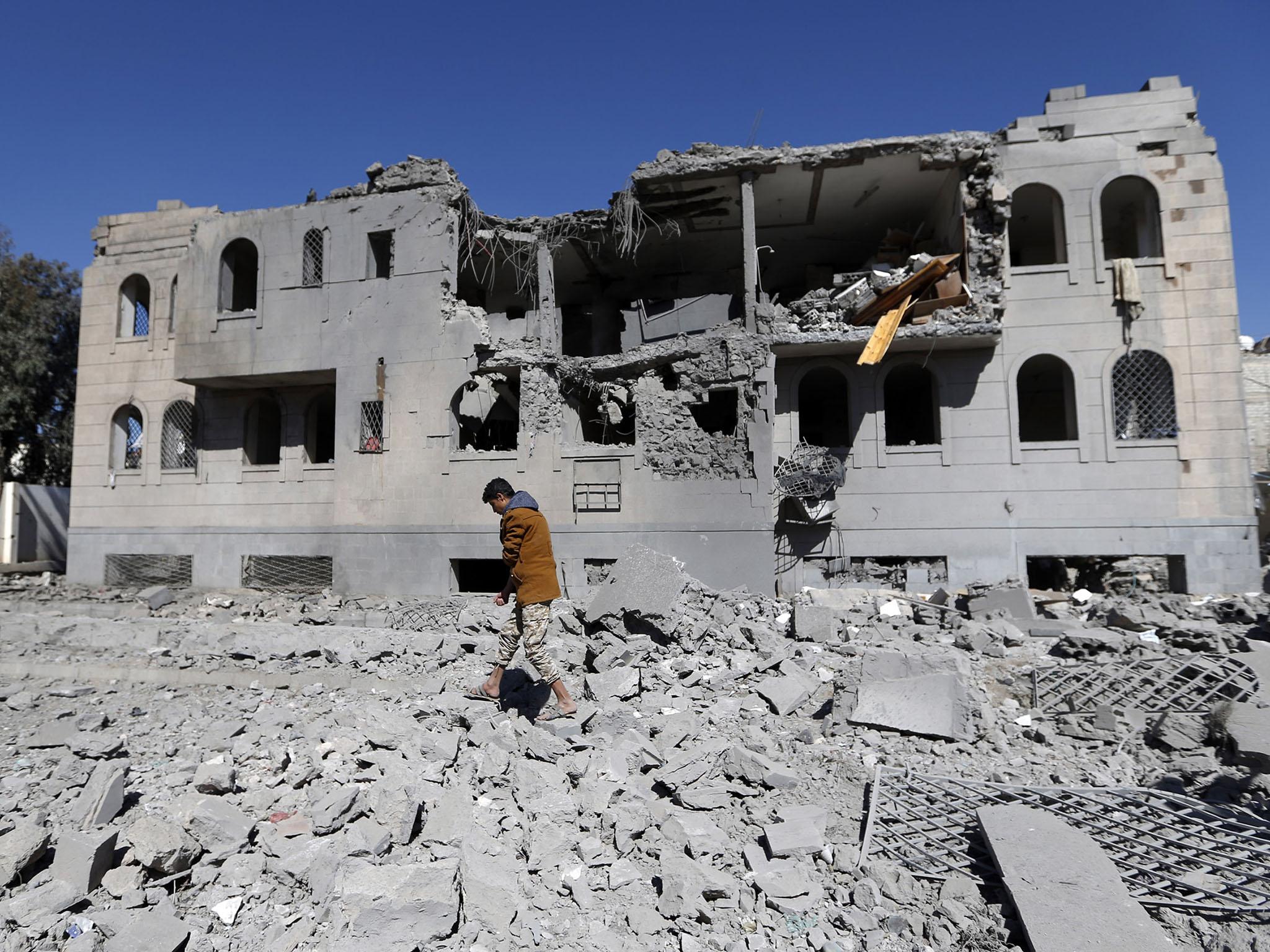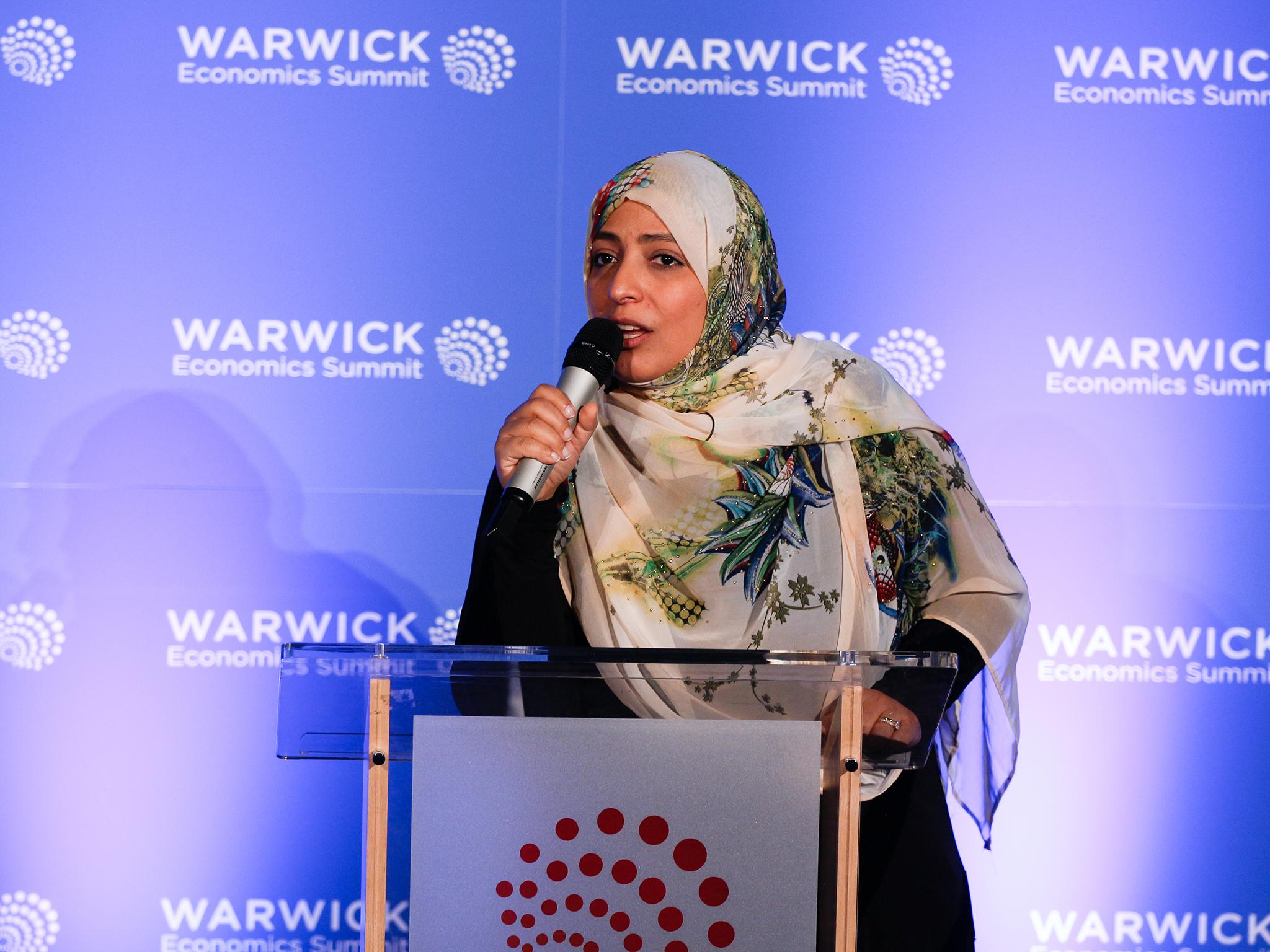UK has responsibility for Yemen crisis after exporting weapons to Saudi Arabia, Nobel Laureate says
Exclusive: Tawakkol Karman urges Britain, the US and Iran to stop supplying the rebel militias and Saudi-led coalition with weapons

Your support helps us to tell the story
From reproductive rights to climate change to Big Tech, The Independent is on the ground when the story is developing. Whether it's investigating the financials of Elon Musk's pro-Trump PAC or producing our latest documentary, 'The A Word', which shines a light on the American women fighting for reproductive rights, we know how important it is to parse out the facts from the messaging.
At such a critical moment in US history, we need reporters on the ground. Your donation allows us to keep sending journalists to speak to both sides of the story.
The Independent is trusted by Americans across the entire political spectrum. And unlike many other quality news outlets, we choose not to lock Americans out of our reporting and analysis with paywalls. We believe quality journalism should be available to everyone, paid for by those who can afford it.
Your support makes all the difference.The United Kingdom has responsibility for the current crisis in Yemen after exporting weapons to Saudi Arabia, Nobel Peace Prize winner Tawakkol Karman has said.
The Yemeni Nobel Laureate has called on a number of countries, including the US and Iran, to stop supplying both the Saudis and the rebel militias with weapons, as Yemen’s devastating famine continues amid civil war.
Ms Karman, a politician and activist, is known in Yemen as the “mother of the revolution” after she took a prominent role in the uprising during the Arab Spring.
She has also urged the UK to “put pressure on Iran” to cease their interference in Yemen as the death toll surpasses 12,000.
“The UK, the US and all the countries that support and sell weapons to Saudi Arabia are part of all the killing in Yemen,” Ms Karman told The Independent. “We should also talk about Iran. Being silent about Iran interfering in Yemen and Iran supporting and exporting weapons to Houthi militia would be a mistake.”

Ms Karman has also called for Mohammed bin Salman, the Crown Prince of Saudi Arabia, and Mohammed bin Zayed, the Crown Prince of Abu Dhabi, to be tried at the International Criminal Court (ICC) for what she described as the “massacres” that have taken place in Yemen.
“I am calling the humans rights defenders to start a trial against them. We want trials in the local courts in Europe and in the ICC. They have committed massacres in Yemen and have caused the war,” she said.
The Saudi-led coalition is waging war in Yemen in a bid to defeat the guerrilla group, the Houthis.
The bombing campaign is believed to have resulted in the deaths of thousands of civilians, and since the war started in 2015 an estimated 18.8 million people, 69 per cent of Yemen’s population, have needed some sort of humanitarian aid or assistance, according to the UN Office for the Coordination of Humanitarian Affairs.
A trial at the ICC is highly unlikely because the court has no jurisdiction over countries that have not signed the Rome Statute.
Saudi Arabia, the United Arab Emirates and Yemen have all not signed the statute, and because of this it would require the United Nations Security Council (UNSC) to refer the case to court for any criminal proceedings to take place.
Geoffery Robertson QC, the former president of the UN war crimes court in Sierra Leone, said initially an investigation would need to be set up by the human rights commission to determine if there had been any crimes against humanity.
If this is shown to be prevalent, the UNSC would pass the issue onto a prosecutor, who would then start their own investigation, before taking the case to the ICC.
“Britain would be put in a difficult position if there was evidence from a UN investigation that demonstrated that the weapons the UK has sold were used for crimes against humanity,” Mr Robertson told The Independent.
The composition of the UNSC means this is unlikely, with Russia and China both intervening in the past to prevent investigations.
Russia has used its veto power to block action targeting its ally Syria on nine occasions, and China has also intervened to ensure the Middle Eastern nation does not face sanctions.
Andrew Smith of Campaign Against Arms Trade said the Saudi-led coalition had “inflicted an appalling humanitarian catastrophe” on Yemen.
“Over the last three years, a coalition of human rights abusers and dictatorships, including those in Saudi Arabia and UAE, has waged a three year bombing campaign that has killed thousands of people and destroyed vital infrastructure all across Yemen,” Mr Smith told The Independent.
“The bombardment has been totally immoral, and it is civilians that have paid the terrible price. Those that have carried it out need to be fully investigated and held to account for the destruction that they have unleashed.
“The brutal bombardment has only been possible because of the complicity and support of politicians like Theresa May and her colleagues, who have prioritised arms company profits over the rights and lives of Yemeni people.”
A spokesperson for the Department for International Trade said: “The UK Government takes its export control responsibilities very seriously and operates one of the most robust export control regimes in the world. We rigorously examine every application, including those from Saudi Arabia, on a case-by-case basis against the Consolidated EU and National Arms Export Licensing Criteria.
“We will not grant a licence if doing so would be inconsistent with these criteria, and have suspended or revoked licences when the level of risk changes.”
Ms Karman was in the UK talking at the Warwick Economics Summit where she accused Saudi Arabia and the United Arab Emirates of backing a campaign to divide Yemen by supporting separatists against the internationally recognised government.
The comments led to her being suspended from her political party in Yemen, al-Islah, which said her statements were “not in line with the party’s positions”.
Ms Karman responded to the claims on her Twitter account and criticised the leaders of al-Islah, calling them “prisoners and slaves” to Riyadh and Abu Dhabi.
The Independent has contacted representatives of the Saudi Arabian government for comment.
Subscribe to Independent Premium to bookmark this article
Want to bookmark your favourite articles and stories to read or reference later? Start your Independent Premium subscription today.
Join our commenting forum
Join thought-provoking conversations, follow other Independent readers and see their replies
Comments